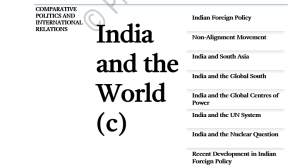Choosing Political Science and International Relations (PSIR) as an optional subject for the UPSC Civil Services Examination can be highly beneficial for several reasons. Here is a detailed exploration of its advantages:
- Overlap with General Studies Papers
Paper I: General Studies I
- Indian Polity: Topics such as the Constitution, political system, Panchayati Raj, public administration, and the rights issues overlap significantly with the PSIR syllabus.
- Modern Indian History: The freedom struggle and post-independence consolidation are integral parts of both PSIR and GS I.
Paper II: General Studies II
- Governance and Polity: There is substantial overlap with the sections on Indian Constitution, political dynamics, and governance.
- International Relations: PSIR provides an in-depth understanding of international affairs, which is directly beneficial for the international relations section of GS II.
- Dynamic and Current Relevance
- Contemporary Issues: PSIR is a subject closely related to current affairs. Regular study of newspapers and journals helps in both GS papers and the optional paper.
- Policy Analysis: Understanding political theories and international relations theories aids in analyzing and critiquing government policies effectively.
- Interdisciplinary Approach
- Integration of Various Fields: PSIR integrates political theory, comparative politics, public administration, and international relations, offering a comprehensive view that is beneficial for the aspirant’s overall understanding.
- Enhanced Analytical Skills: The subject requires analysis of political systems, international dynamics, and philosophical arguments, improving the aspirant’s analytical abilities.
- Scoring Potential
- Structured Syllabus: The PSIR syllabus is well-structured and defined, allowing for focused preparation.
- Availability of Resources: There is a wealth of study material, including standard textbooks, notes from coaching institutes, and online resources.
- Previous Years’ Papers: A consistent pattern in the questions asked over the years helps in targeted preparation and practice.
- Success Rate: PSIR has a success rate of approximately 8%, which is relatively high compared to other optional subjects, indicating its scoring potential.
- Comprehensive Coverage
- Political Theory and Thought: Covers Western and Indian political thought, providing a solid foundation in understanding diverse political ideologies.
- Comparative Politics: Helps in understanding different political systems and governments worldwide, which is beneficial for a global perspective.
- International Relations: Detailed study of global politics, international organizations, and bilateral relations enhances the candidate’s grasp over world affairs.
- Essay and Interview Benefits
- Essay Writing: The knowledge gained in PSIR can be directly applied to writing essays, especially on topics related to governance, democracy, international relations, and political philosophies.
- Personality Test (Interview): The understanding of political scenarios and current international issues provides a strong foundation for answering questions related to governance, policies, and global affairs in the interview.
- Administrative and Bureaucratic Benefits
- Policy Formulation: A deep understanding of political science and international relations aids in formulating and implementing policies effectively.
- Governance Skills: Knowledge of political systems, governance models, and public administration is directly applicable to administrative roles in the civil services.
- Global Perspective: Awareness of international relations and global political dynamics is crucial for roles involving foreign affairs, trade negotiations, and international cooperation.
- Interest and Background
- Interest Alignment: Many aspirants have a background in political science or international relations from their undergraduate or postgraduate studies, making PSIR a natural choice.
- Engaging Subject: The subject is often found to be interesting and engaging, which helps in sustaining motivation and interest during the long preparation period.
Conclusion
Studying PSIR as an optional subject for the UPSC examination offers a blend of strategic advantages, content overlap, scoring potential, and intellectual enrichment. It is a well-rounded subject that not only aids in the examination but also contributes to a deeper understanding of political and international dynamics, enhancing the overall competence and perspective of an aspirant. The administrative and bureaucratic insights gained through PSIR further prepare candidates for effective governance and policy implementation in their future roles.


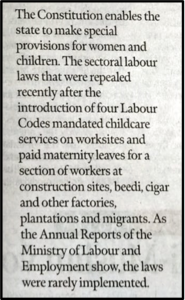
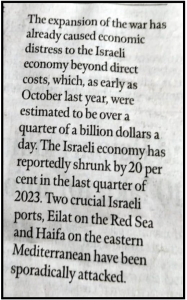
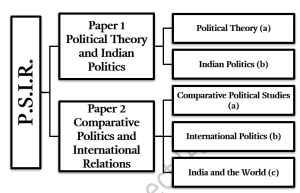
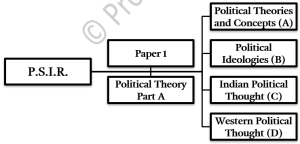
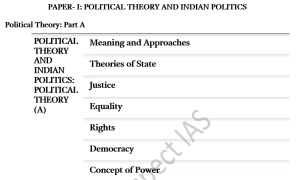
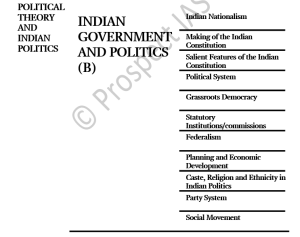
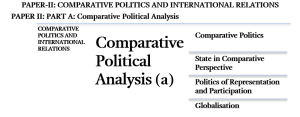 Comparative Politics
Comparative Politics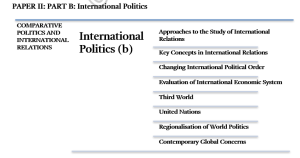 Approaches to the Study of International Relations
Approaches to the Study of International Relations
